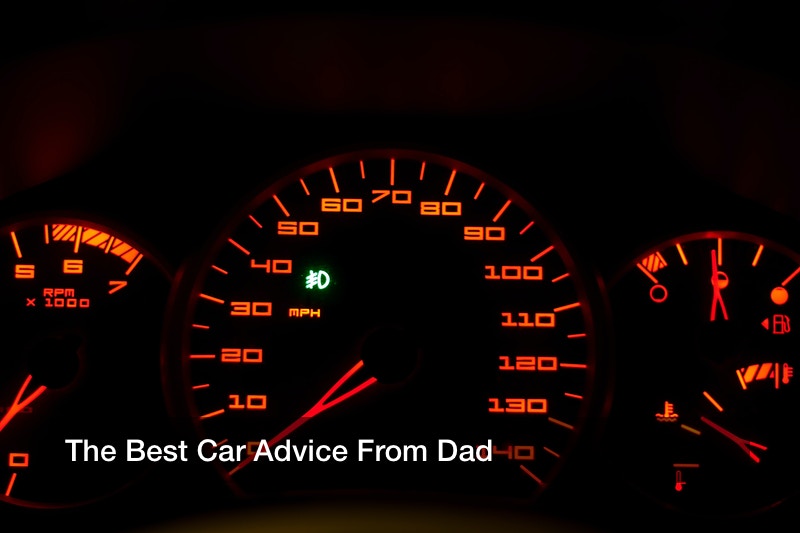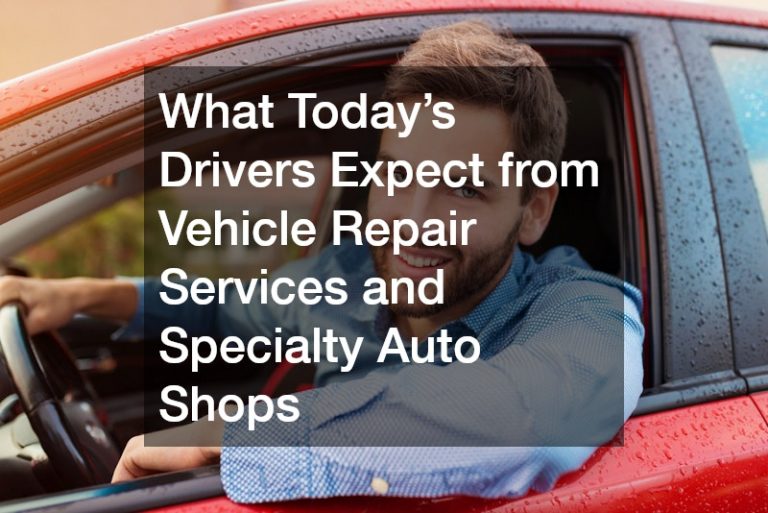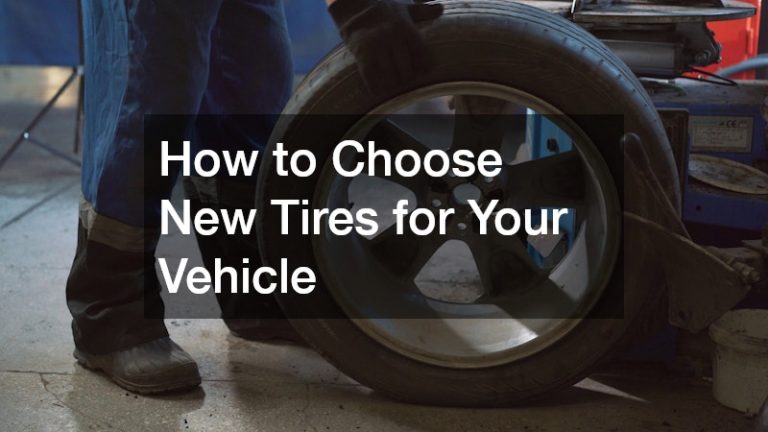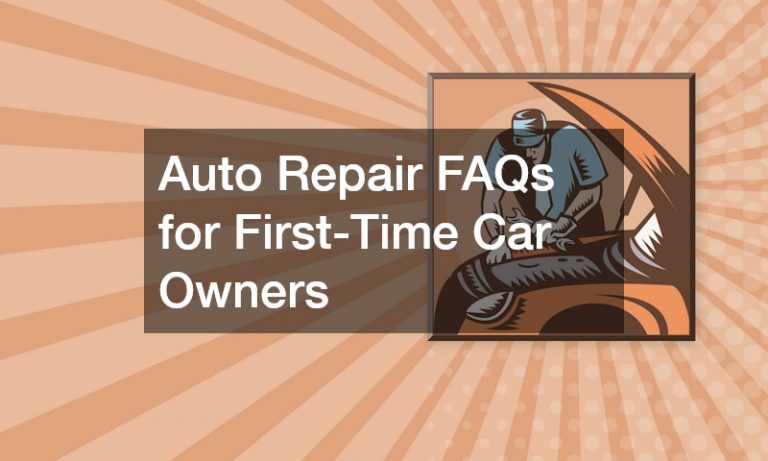

Everyone has someone who they go to for the best car advice, whether it be a friend, family member, or neighbor. Oftentimes, you go to your dad for the best car advice. Your dad usually acts as your first mechanic. They teach you about general car repair, driving a stick shift, checking your oil, changing a tire, or even jump-starting a car.
The Best Car Advice For Beginners
Your first car is usually one that your dad passes down to you when you come of age. This is often a used car, since about 75 percent of all automobile sales are used cars. However, owning a car is still very new to you and you will need to be filled in. Your dad can show you how to complete simple tasks like replacing the windshield wipers, checking the tire pressure, and waxing and polishing the car. Other maintenance work like brake repair or changing the oil is best left to the professionals, along with any other major repairs.
For many new and even some used cars that are still under warranty, all repairs can be taken directly to the dealership where the vehicle was purchased for free maintenance work. If you are dealing with a more expensive repair, you should shop around various repair shops and get more than one estimate. This will ensure you find the best price. There are many vehicle and trailer repair estimators online that will help you find the best price based on your location. Your dad will usually fill you in on everything else you need to know about maintaining your own car, whether it is used or new. If not, here is some of the best car advice to help.
The Best Car Advice
Looking at the owner’s manual. Though often overlooked, reading your car’s owner’s manual is some of the best car advice you can receive. A common mistake made by first-time car owners is ignoring the owner’s manual unless something goes wrong. The owner’s manual will explain all of your vehicle’s features, what types of oil and windshield wiper fluid to use, safety information, and the recommended schedule for maintenance. The owner’s manual will explain all these details in very simple terms. If your used car happened not to come with an owner’s manual inside, you can find one for free online.

Looking out for issues. Use your senses to help you determine if there is anything wrong with your car. This includes any unusual smells, noises, or fluid leaks. In addition, pay close attention to any sudden changes in performance, like decreased acceleration, diminished braking, or changes in the steering capabilities. Ignoring these warning signs will only serve to exacerbate the issue and result in a more expensive repair bill later on down the road.
Maintaining tire pressure. Some of the best car advice you could receive is on the importance of maintaining tire pressure, since keeping your tires properly inflated is widely considered the most important routine maintenance task. Underinflated tires will be incredibly detrimental to your vehicle’s overall health. Underinflated tires will waste gas, wear more quickly, and degrade your vehicle’s handling. To prevent this from happening, check your car’s tire pressure at least once a month and before any long trips you may take. To remind you and make this task easier, keep a tire pressure gauge in the trunk of your car. A digital gauge with an illuminated readout is the easiest to use and read.
The optimal inflation pressure for your vehicle can usually be found printed on a sticker on the side of the driver’s door. Occasionally, this figure is also printed on a sticker inside of the glove box or the gas cap.
Maintaining the paint. Regularly washing and waxing your car will help protect its coat of paint from weather elements, bug splatters, corrosive salt, road grime, and bird droppings. An application of wax will usually only last a few weeks, despite what the product may advertise. A paste wax is usually preferable to a liquid polish and the more expensive premium brands of wax do not necessarily last longer than the cheaper alternatives.
Following the recommended periodic service schedule. Another piece of the best car advice is to follow the recommended schedule for maintenance found in the owner’s manual. This includes how often the oil should be changed and major services such as replacing the timing belt. It is important to be aware that you do not have to have your car serviced more often than is recommended in the owner’s manual, despite what an auto repair or service shop tells you.
Joining an auto club. An auto club like the American Automobile Association or Better World can be a gigantic help in a time of desperate need, such as breaking down, getting a flat tire, or needing to be towed. These clubs provide roadside assistance 24 hours a day, 7 days a week to help you out if any of these problems occur. A membership with these clubs will often come with added benefits and discounts on hotels and rental cars. Car insurance companies are often affiliated with an auto club. You can ask your insurance agent for additional information regarding any possible affiliations they may have.
Replacing the windshield wipers. Your vehicle’s windshield wipers do not last as long as you think they do. Windshield wipers will generally last around six months at most. After that, the wipers will begin to leave streaks on your windshield. If the rubber part of the windshield wiper wears off or falls off completely, the plastic part of the wiper arm will be unprotected and will permanently damage your windshield in as little as a few minutes. At worst, this could break the windshield, leaving you in need of broken window repair. After a few months of use, you can help maintain your windshield wipers with some paper towels and a glass cleaner. Just simply wipe any debris off the rubber part of the wiper and the windshield where the wiper lays. This simple maintenance task can extend the life of your windshield wipers by a few months.

Carrying your car documents. It is recommended that you keep all your documents and receipts related to your vehicle on hand, most often in the glove department of your car. This way, all your dated service records and warranty cards for your battery, muffler system, or tires are always on hand. This is not to mention other important documents such as your insurance card and your vehicle’s registration certificate, which should be always kept in the car. However, you should always keep your vehicle’s title certificate at home, in a safe place.
A dealership versus an independent repair shop. An independent auto repair shop will usually cost less than a dealership. This is because your local or independent repair shop usually charges less for parts and has lower labor rates compared to a franchised dealership. However, a franchised dealership will have a repair and service department with trained technicians that specialize in the brand of cars they sell and have access to special tools. In many automobile surveys, customers often report higher satisfaction with a local or independent repair shop.
Opting for a local mechanic. You can ask around for recommendations for a local service shop or mechanic. If a repair shop is displaying a certificate from a national certification organization like the National Institute for Automotive Service Excellence, their mechanics are likely well qualified and trustworthy. However, that does not ensure that every employee in the shop who works on your car has the same certifications or qualifications. If a repair shop is affiliated with the American Automobile Association, they are also likely trustworthy and qualified. Once you establish a relationship with a garage, you can habitually have repair and maintenance done there. Whether it is a franchised dealership or an independent repair shop, you will likely have a better experience once you are a loyal customer.
Learning how to change a flat tire. Some of the best car advice you will receive will pertain to changing a flat tire, since chances are that you will get a flat tire at some point. If you have never changed a tire before, you can learn by reading the owner’s manual and then by practicing installing your spare with the jack and tools that come with your vehicle. Ask someone who is more experienced with changing tires to help you out for the first time.

If you have an older car, the wheel nuts can be difficult to loosen with the wrench that comes with your vehicle. If that is the case, head to an auto parts store and look for a long torque wrench or a cross handled wheel lug wrench and keep it in the trunk of your car. A flat tire will happen at a time when you least expect it. Proper preparation and practice will help you handle the situation quickly and calmly.
The Importance of Car Insurance
Other than advice on how to maintain your car, some of the best car advice you will receive from your dad is on the importance of car insurance. The main reason car insurance is important is because of liability. In terms of the law, liability refers to an individual being financially responsible for any damage or injury they cause. In the United States, car accidents cost a total of 230 billion dollars every year. If you are in an accident, you may end needing legal assistance.
Most states require drivers to have property damage and bodily injury covered by their auto insurance policies, while other comprehensive and collision coverage for your own vehicle is usually optional. However, every state has its own laws regarding the minimum coverage limit. At a minimum, your car insurance policy must provide financial relief for potential victims of an accident you may cause as well as cover the cost of any material damage. If you are in a car accident, contact an accident attorney immediately.
The Minimum Coverage Limit
To register your vehicle and legally drive in your state, you need to have an auto insurance policy that meets your state’s minimum level of liability car insurance. If you are currently financing or leasing a vehicle, there is likely a different standard for minimum liability coverage in your state. You may be required to have additional coverage such as gap insurance or collision and comprehensive coverage.
For a vehicle that is leased or financed, a gap insurance policy is additional insurance that covers the financial gap between the amount of money the insurance company will give you for the car if it is totaled and the amount of money you will then owe to the dealership or lender. The reason for this gap is because most car insurance companies will pay you the actual cash value and not the replacement cost value. The bank or dealership usually requires its customers to carry gap insurance because they have an interest in protecting their investment with an improved level of coverage.
Why You Need Car Insurance
While liability car insurance is required by law, you may be wondering why you need it. In fact, one in eight drivers in the United States decide to drive without liability insurance altogether. The important thing to understand about liability insurance is that its importance only reveals itself in an unfortunate situation, such as a car accident or an inclement weather event such as hail. These are a few other reasons that reveal why getting good car insurance is some of the best car advice you can receive.

It Will Save You Money
If you drive without car insurance, you are putting a lot of money at risk and possibly all or some of your assets. For instance, a car accident costs an average of 9,300 dollars in property damage. If you include accidents that cause disabling injuries, the average cost skyrockets to 80,700 dollars. If you or another driver experienced injuries as a result of a car accident, get in touch with an accident injury attorney right away.
A liability car insurance policy will protect you from these incredibly large and unexpected expenses. Along with helping you with these expenses, your insurer will also help protect you and your assets from liability lawsuits. If your insurance policy includes auto collision repair, personal injury protection to cover medical bills for you and other passengers, and most importantly liability coverage with high limits, you can potentially save thousands of dollars after a car accident. Listen to the best car advice and make sure you have a good car insurance policy.
Related Topics: 1 10th rule for car buying, 10 tips for buying a used car, 101 used cars, 12 hottest new cars for 2017, 15 cars to avoid buying, 20000 car games, 2017 auto buyers guide, 2020 auto reviews, 2020 new car reviews, 24 on cars, 5 used cars not to buy, a and a used cars, a guide to buying a used car, acura corporate number, advice dealer, advice on buying a first car, afford a car reviews, after buying used car what to do, am i getting a good price on a used car, audi cin, auto buying tips.



